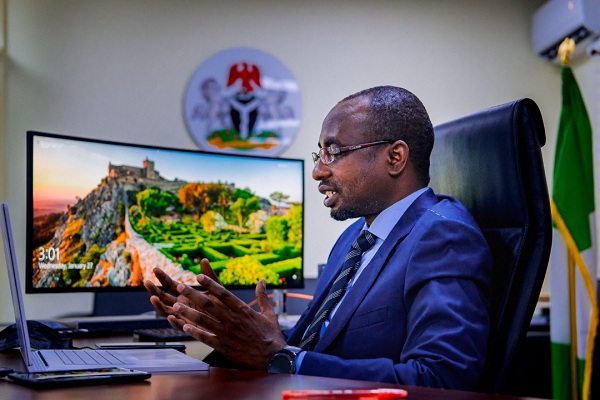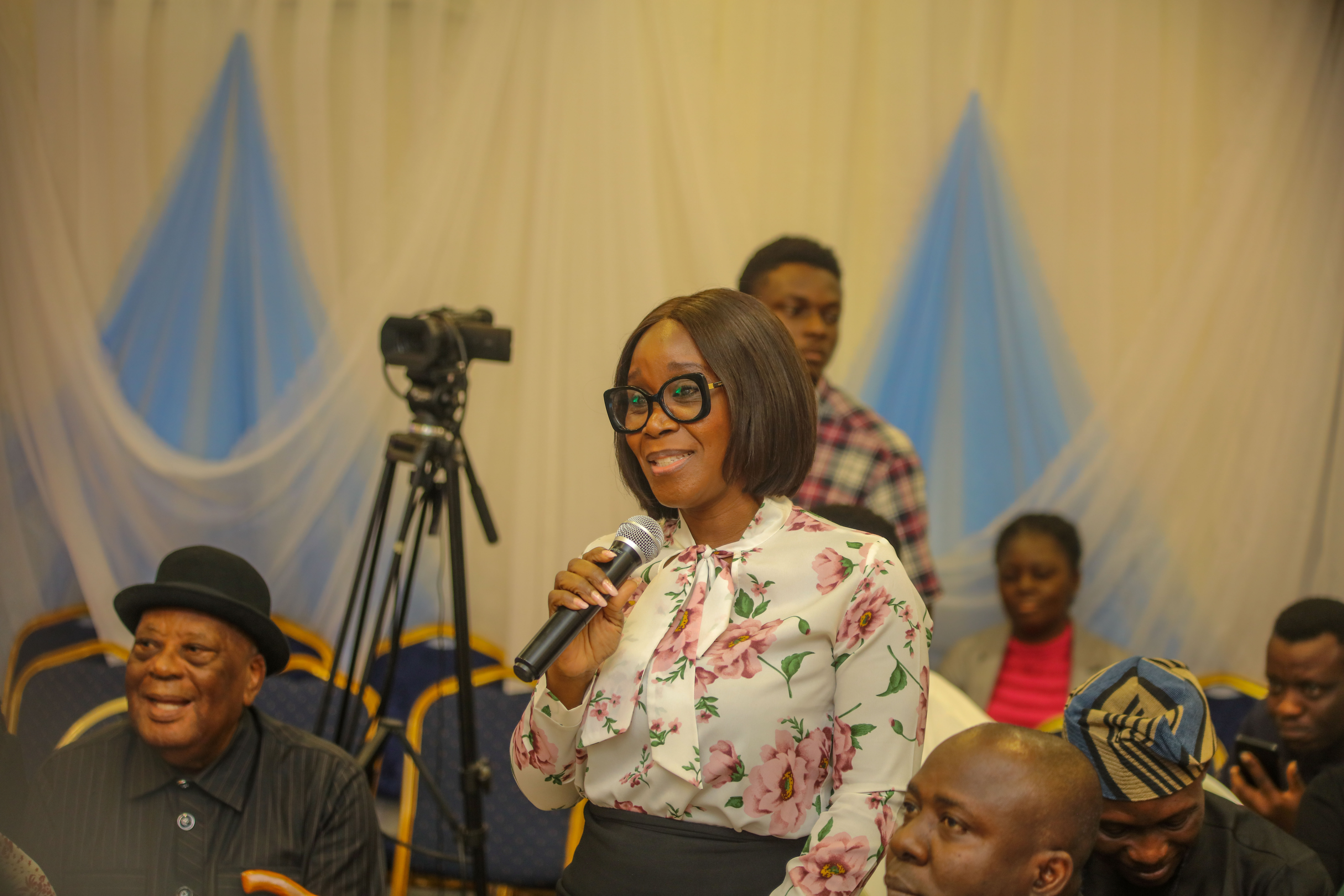Telecom
Regulating Local Content is Transforming Nigeria’s Economy – DG NITDA

Mallam Kashifu Inuwa Abdullahi, Director General of National Information Technology Development Agency (NITDA), has said that regulating indigenous content development and adoption is one of the strategic pillars that is transforming Nigeria’s economy, as well as putting the country on the right to tract in achieving Digital Economy.
Abdullahi said this at an online webinar on Local Content Policy in the ICT Sector with the theme:”Local Content Policy in the ICT Sector as key to Achieving Objectives of the Digital Economy in Nigeria”organised by Centre for Information Technology and Development (CITAD) in collaboration with NITDA and Speedstar.
He stated that in August, 2020, NITDA updated the Guidelines for Nigerian Content Development in ICT to align with the two issued executive orders 003 and 005, which led to enforcing compliance with all local content policy in IT projects through the Agency’s IT project clearance mandate.
“Through our modest efforts we have transformed the landscape and stimulated demand for made in Nigeria ICT products and services.
“Our policies have increased the consumption of local hardware in an unprecedented manner from annual sale of 113,814 in 2015 to 414, 510 in 2018 and 364,376 in 2019.
“We also facilitated patronage of indigenous software, amounting to over 3 billion naira through our regulatory local content guidelines and IT clearance,” he said.
He added that Local Content Policy in the ICT sector under the purview of the Agency has played a crucial role in increasing the consumption of local content, placing policies on the use of local content items in the various Ministries, Departments and Agencies (MDAs) across the country.
“The Administration of President Muhammadu Buhari, has given a special priority to diversification through strengthening of our indigenous content and local production with the motive to boost the boost the Nation’s Gross Domestic Product (GDP).
“In 2015 the country’s economy was down due to the fall in oil price crash, a team of experts was setup to develop policy for the government to diversify our economy, which gave birth to Economic Recovery and Growth Plan (ERGP) 2017 – 2020.
“The Economic Recovery and Growth Plan (ERGP) is a Medium Term Plan for 2017 – 2020, for the purpose of restoring economic growth, building a globally competitive economy and accelerating inclusive growth by investing in our people the nation’s most priceless assets. The policy also identified Information and Communication Technology (ICT) as the key enabler, he added.
The NITDA boss said that the Federal Government of Nigeria issued two executive orders 003 in May, 2017 to support procurements of local content products and services by Ministries Departments and Agencies (MDAs), while Executive Order 005 was issued in February, 2018 to promote Nigerian content in planning, execution of projects and contracts in science engineering and technology respectively.
“Digital Economy is the fastest growing economy in Nigeria and the World in general. To sustain and consolidate the growth we need to ignite innovation and entrepreneurship in the digital space.
“Most of our initiatives today are innovation ecosystem centric that will help us to come up with ideas that will create values in Digital space,” he emphasized.
He further stated that guidelines for Nigerian Content Development in ICT require Multinational Companies (MNCs) operating in Nigeria to submit a annual report on local content development activities.
According to him, assessment of the 2018-2019 Local Content Development Reports submitted by 9 MNCs indicates that a total of 663 Nigerians are employed by the MNCs and also, about 2,033 direct and indirect jobs were created through the MNCs activities.
The DG added that it also supported 88 Nigerian Startups, trained 28,773 Nigerians on emerging technologies, 58,892 Girls/Women trained in ICT, about 1,354,988 Nigerians were trained in Digital Skills, 71,289 ICT Scholarship Programs for Nigerians, 519,313 Nigerians were trained in ICT Professional Development.
“To sustain and consolidate on these achievements, the government rolled out Nigeria Economic Sustainability Plan and in line with the sustainability plan our Ministry under the leadership of Dr Isa Ali Ibrahim Pantami, Minister of Communications and Digital Economy, sought the President’s approval to re-designate and expand the mandate of our Ministry to cover digital economy.
“This request was graciously approved and the Minister formulated the National Digital Economy Policy for Digital Nigeria. The minister has issued more than a dozen policies to support the implementation of the Digital economy.
“Digital economy is mainly driven by rapid business innovation, using digital technology to deliver new customer value proposition, new business model, new organizational structure, new customer experience, operational excellence and enhanced products and services. This cannot be achieved in isolation; we need innovation ecosystem.
“It is obvious that innovation is not evenly distributed globally but there is something common among all innovative countries. They all have a strong innovation ecosystem.
“To build a vibrant innovation ecosystem in Nigeria, we have keyed into MIT program call REAP – Regional Entrepreneurship Acceleration Program. REAP is a global capstone initiative that provides opportunity for communities to engage with MIT in an evidence-based and practical approach to strengthen innovation ecosystem. This centre will serve as a platform for the MIT-REAP initiative,” he said
Abdullahi pointed out that COVID-19 has impacted lives in an unprecedented way, many aspects of lives – work, education, economy, entertainment, have moved online.
According to data compiled by Visual Capitalist, in a single internet minute in 2020, consumer spend more than 1m USD, over 42 million messages shared via WhatsApp, more than 1.4 million people make video or voice call, over 150,000 messages shared on Facebook, more than 319 new accounts created on Twitter, LinkedIn users apply for over 69,000 jobs, more than 6,500 packages shipped by Amazon, and over 200,000 people participate in Zoom meetings.
Telecom
US Bans Use of WhatsApp on Official Devices over Security Concerns

United States (US) House of Representatives has banned WhatsApp from all official devices as a result of data privacy and security concerns.

Harry Coker, acting national cyber security (ONCD) Director confirmed this via a statement issued on Monday, June 23 stating that WhatsApp’s high risk classification is attributed to the messaging app’s ambiguous data protection policies, inadequate encryption for stored data, and other potential security vulnerabilities.
He stated that staff have since been advised to utilize more secure communication platforms, with recommended alternatives including Microsoft Teams, Apple’s iMessage and FaceTime, Signal, and Amazon’s Wickr.
However, Nick Clegg, president of Global Affairs for Meta, WhatsApp’s parent company, has strongly opposed the ban.
He said, “We disagree with this decision in the strongest possible terms, whatsApp provides a higher level of security than the other approved apps.”
This ban on WhatsApp is not an isolated incident, it follows previous restrictions on other applications, such as TikTok, which was removed from government devices in 2022.
The decision also comes just months after WhatsApp itself confirmed that Israeli spyware firm Paragon Solutions had targeted some of its users, including journalists and civil society figures.
Telecom
MTN Nigeria Receives UN Women Award for Empowering Women Nationwide

MTN Foundation has received accolades from UN Women, the United Nations entity dedicated to gender equality and the empowerment of women.

The recognition, presented during a profile courtesy visit by UN Women representatives to MTN Nigeria’s Head Office in Ikoyi, Lagos, acknowledged the Organisation’s profound contributions to advancing women’s empowerment across the nation.
The UN Women delegation, led by Beatrice Eyong, UN Women Country Representative to Nigeria, commended MTN and its Foundation for their unwavering commitment to fostering an inclusive society where women thrive.
During the presentation, Beatrice Eyong, UN Women Country Representative to Nigeria, expressed profound admiration for MTN’s efforts. “I want to congratulate MTN for all that they have been doing,” Eyong stated, her voice resonating with appreciation. “And I want to congratulate MTN Foundation specifically, because they are leaving things better than they met them especially with their Mother and Child Initiatives.” Her remarks highlighted MTN’s focused impact, suggesting a significant improvement in the landscape of women’s empowerment due to the company’s interventions.
Odunayo Sanya, Executive Director of the MTN Foundation, received the award and further elaborated on the company’s broader commitment to societal upliftment through women’s empowerment. ” Our Y’ellopreneur program targeted at Female entrepreneurs is about creating access for our Female Entrepreneurs – access to skills, capital and markets. Our commitment is to contribute to the success of women – led businesses in Nigeria.
This focus on economic empowerment through skills development directly benefits women seeking to improve their livelihoods. This recognition comes as MTN Nigeria continues to champion various programmes aimed at uplifting women, from promoting gender diversity within its corporate structure to supporting women-led businesses and initiatives.
The company’s alignment with global best practices, including its recent signing on to the United Nations Women Empowerment Principles (WEPs), further solidifies its position as a leader in corporate social responsibility and gender equality advocacy.
The award serves as a testament to MTN Nigeria’s strategic and impactful investments in creating a more equitable future for Nigerian women.
Telecom
15 African Startups Using AI Selected for Google Accelerator Cohort 9

Google today announced the selection of 15 promising tech startups for its Google for Startups Accelerator: Africa Class 9 program. These innovative startups, hailing from Ghana, Ethiopia, Kenya, Nigeria, Rwanda, Senegal, and South Africa, are leveraging artificial intelligence (AI) to address significant challenges across diverse sectors, including fintech, agritech, healthtech, and professional services.

In an era where startups are at the forefront of solving critical challenges across Africa, these innovators often face significant hurdles to scale their operations, particularly in securing essential support, mentorship, and funding. Programs like the Google for Startups Accelerator: Africa play a crucial role in providing these opportunities, enabling tech founders and innovators to amplify their impact. By bringing together Google’s extensive resources, including cutting-edge AI technologies and a global network of experts, the program aims to equip these startups to not only thrive but also lead in addressing both local and global challenges in this AI era.
The selection follows a highly competitive application process that began in April 2025 , drawing nearly 1,500 applications from across the continent. This cohort underscores Google’s deep commitment to fostering Africa’s vibrant tech ecosystem and supporting startups in their growth journey.
“African startups are at the forefront of solving critical challenges across the continent, and their work with AI is truly transformative,” said Folarin Aiyegbusi, Head of Startup Ecosystem, Africa at Google. “This program reflects our belief that AI can be transformative when shaped by those who understand the context deeply. We are incredibly excited to support these founders who are building for impact and helping to shape an inclusive AI ecosystem across Africa.”
Over the next three months, the selected startups will participate in a hybrid accelerator program (June 23rd to August 22nd, 2025). Participants will receive dedicated technical mentorship from experienced Google engineers and industry experts , up to $350,000 in Google Cloud credits , and strategic support in AI implementation, product leadership, and business growth. They will also gain access to a global network of investors, partners, and collaborators, amplifying their reach and impact.
Since its inception in 2018, the Google for Startups Accelerator Africa program has supported 153 startups from 17 African countries. Collectively, these alumni have raised over $300 million in funding and created more than 3,500 jobs. Google has directly contributed $5 million through a combination of equity-free funding and product credits to support these founders.
The Google for Startups Accelerator: Africa Class 9 cohort includes:
AFRIKABAL (Rwanda): A blockchain and AI-powered platform helping farmers, buyers, and logistics firms trade crops securely and transparently.
Apexloads (Kenya): A logistics SaaS platform helping African freight brokers, forwarders, and transporters move cargo faster with verified partners.
E-doc Online (Nigeria): Simplifies compliance and credit checks by analyzing real-time banking data, enabling faster onboarding and smarter lending decisions.
GoNomad (Nigeria): Enables businesses to start and run global entities, and solopreneurs to professionally invoice and get paid globally like a local.
Midddleman (Nigeria): An intelligent sourcing and payment platform helping African businesses import and pay for goods from China faster, safer, and cheaper.
Myltura (Nigeria): An AI-powered digital health platform enabling remote care, test access, and seamless health data management in Africa.
Pastel (Nigeria): Offers Enterprise AI solutions, inc. AI based fraud detection and anti-money laundering solutions to financial institutions in Africa.
Rapid Human AI (South Africa): An end-to-end AI design-thinking platform that turns ideas into code in days, cutting development time by 80%.
Regulon (Ghana): An AI-powered compliance and onboarding platform designed to simplify regulatory processes for businesses across Africa and the EMEA region.
Scandium (Nigeria): An AI Quality Assurance suite that helps teams ship bug-free software faster with end-to-end test automation and test ops tooling.
Shamba Records (Kenya): An AI-powered platform that empowers 50,000+ African farmers with smart credit, market access, and climate-resilient, data-driven agriculture.
Smartel Agri Tech (Rwanda): Helps smallholder farmers in the Global South get ahead of crop pests and diseases early using AI-powered, solar-driven devices and SMS alerts.
TOLBI (Senegal): Leverages AI and satellite imagery to empower sustainable agriculture across Africa, providing precise crop yield forecasts.
YeneHealth (Ethiopia): An AI-driven digital health web, and mobile app streamlining access to affordable, reliable, quality medications & health care services.
Zerone Analytiqs (Ghana): A transformative two-pronged solution to the data scarcity in Africa, We are revolutionizing how data is sourced, analyzed, and utilized for decisions.
For further information and updates, visit the Google Africa Blog or follow @GoogleAfrica on social media.

 Telecom3 days ago
Telecom3 days agoLebara, New Operator Enters Nigerian Telecom Arena, Sells Minutes, Not Airtime

 General News2 days ago
General News2 days agoOpenAI Unveils New AI Agent for Software Developers

 E-Business3 days ago
E-Business3 days agoOver 7m Streaming Accounts’ Credentials were Leaked in 2024 – Report

 E-Financial3 days ago
E-Financial3 days agoFidelity Bank Uplifts Old People’s Home with Essential Items Donation

 E-Financial3 days ago
E-Financial3 days agoS&P Global Ratings Downgrades Ecobank Nigeria’s Credit Rating to CCC-, Outlook Negative

 Telecom3 days ago
Telecom3 days agoPIN Pushes for Equitable Digital Governance at World Internet Forum

 Telecom2 days ago
Telecom2 days ago15 African Startups Using AI Selected for Google Accelerator Cohort 9

 E-Financial3 days ago
E-Financial3 days agoEFCC Drags Cititrust to Court over Unreported ₦200mTransfers



























